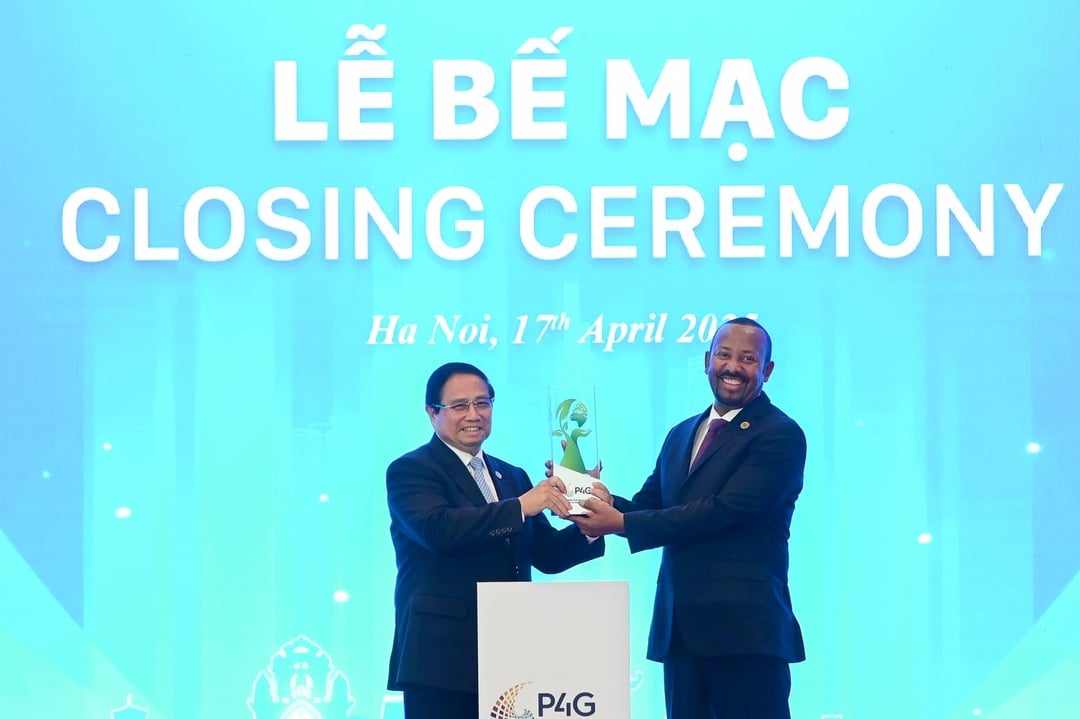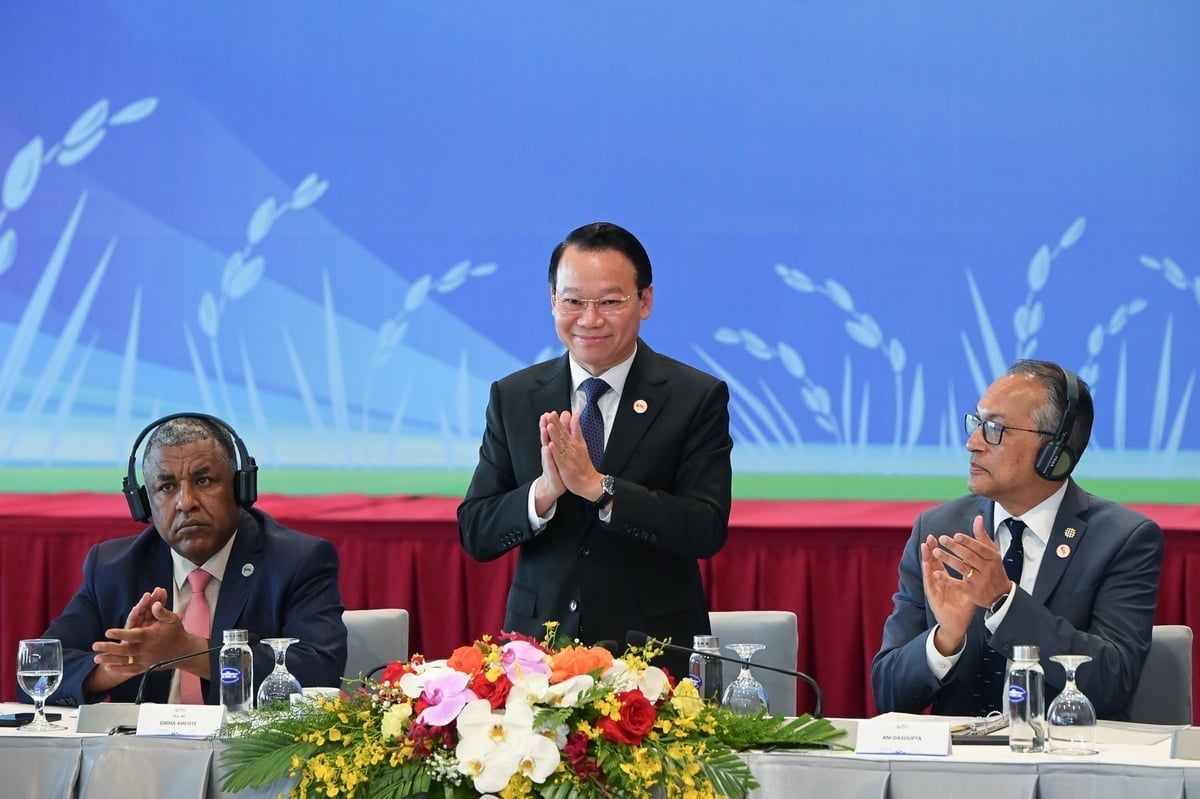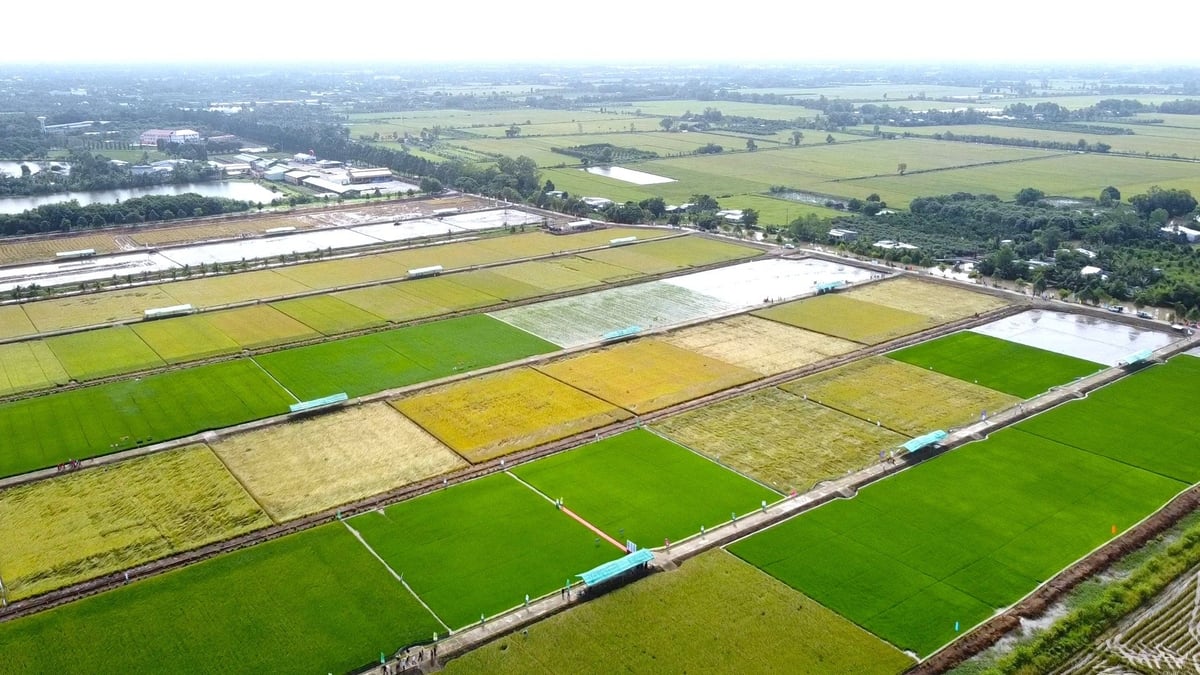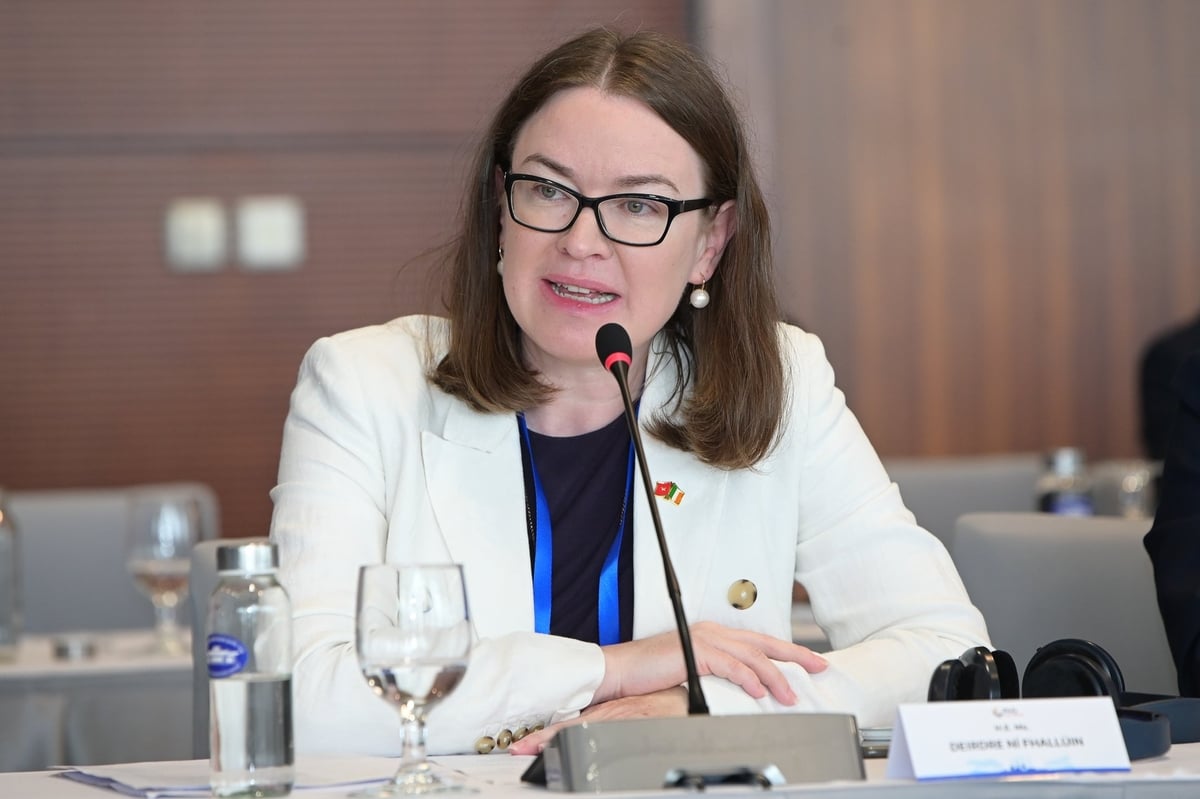June 15, 2025 | 15:56 GMT +7
June 15, 2025 | 15:56 GMT +7
Hotline: 0913.378.918
June 15, 2025 | 15:56 GMT +7
Hotline: 0913.378.918

Prime Minister Pham Minh Chinh officially handed over the role of P4G Summit host to Ethiopian Prime Minister Abiy Ahmed Ali. Photo: Tung Dinh.
The Partnering for Green Growth and the Global Goals 2030 (P4G) Summit was held in Hanoi from April 15 to 17, 2025. With the theme “Sustainable and people-centered green transition,” this event marks the largest multilateral high-level forum on green growth hosted by Vietnam during the 2021–2026 period.
At the Summit’s conclusion, delegates collectively recognized green transformation as an inevitable journey, an objective demand, a strategic choice, and a top priority for achieving SDGs. This journey calls for global efforts and cooperation across governments, businesses, communities, and individuals to promote inclusive and equitable growth, leaving no one behind.
Highlighting the outcomes, Prime Minister Pham Minh Chinh stressed five consensus results achieved during the P4G Summit. Among them, countries and international organizations are committed to transforming agricultural and food systems sustainably, ensuring food and nutritional security, and strengthening environmental protection and sustainable development.
Vietnam’s active participation, through managers, entrepreneurs, and scientists at international forums, helped amplify the voice of the agriculture and environment sectors, contributing significantly to this success.
Within the framework of the P4G Summit, Minister of Agriculture and Environment Do Duc Duy chaired a ministerial-level discussion with the theme "Riding with the Green Revolution 4.0: The Journey of Transforming the Food System for a Sustainable Era.”
Here, Vietnam reaffirmed its commitment to be an active and responsible partner with countries, international organizations, and businesses in the journey of transforming the global food system towards transparency, responsibility, and sustainability.

Minister Do Duc Duy chaired a session themed 'Riding with the Green Revolution 4.0: The Journey of Transforming the Food System for a Sustainable Era.' Photo: Tung Dinh.
Speaking at the forum, Mr. Donal Brown, Vice President of the International Fund for Agricultural Development (IFAD), highlighted the responsibility of the Ministry of Agriculture and Environment (MAE) in transforming Vietnam's food security system.
"Vietnam’s MAE is uniquely positioned to lead the transformation efforts, turning ideas into impactful actions. We don’t need to reinvent the wheel. Proven solutions are already transforming lives,” said Brown.
He cited the alternate wetting and drying (AWD) irrigation technique, which the Ministry has standardized as a high-quality, low-emission method for rice cultivation. While AWD has now been adopted in many rice-growing countries in Asia as a smart agricultural solution, Vietnam holds an advantage due to its long-standing tradition of irrigation practices. For Brown, this represents a model of innovation built on cultural habits and the country’s socio-economic realities.
Ms. Nguyen Thi Ngoc Diep, Vice Chairwoman of Can Tho City People’s Committee, was the only local representative of Vietnam to share at the discussion session. Can Tho city is actively participating in the One Million Hectares of High-Quality, Low-Emission Rice project in the Mekong Delta, registeringd an area of 48,000 hectares in the project.

Can Tho city actively participates in the One Million Hectares of High-Quality, Low-Emission Rice project in the Mekong Delta. Photo: Kim Anh.
From the summer-autumn crop of 2024, Can Tho city will build a pilot model with a scale of 50 hectares, then expand the model to a total area of 170 hectares. All models apply the solution of direct seeding and alternating wetting and drying (AWD) irrigation.
The procedure has helped to significantly reduce the amount of irrigation water, reducing methane emissions. In terms of productivity, it is 0.3 - 0.7 tons/ha higher than that of farmers cultivating by traditional methods. In addition, the model of utilizing straw by-products, farmers growing mushrooms, and making organic fertilizers increased their income by 33 million/ha/3 crops. The results of greenhouse gas emission measurements show that the model reduces emissions.
Ethiopian Minister of Agriculture - Dr. Girma Amente - representing the host country of the 5th P4G Conference, shared experiences in overcoming poverty, from a country at risk of food insecurity to becoming the largest wheat producer in Africa.
Faced with the challenges of climate change and resource degradation, Ethiopia has designed a comprehensive food and nutrition transformation roadmap, with 24 innovative solutions. Over the past 5 years, the Ethiopian government has expanded wheat production in lowland areas. Ethiopia has also developed an irrigation system to help mountainous and highland areas proactively irrigate, reducing dependence on rainwater in rice cultivation.
With this roadmap, Ethiopia has successfully linked its food system transformation goals with climate actions, committing to the United Nations Framework Convention on Climate Change (UNFCCC).
Like Ethiopia, Ireland has set an objective for Food Vision 2030. According to Irish Ambassador to Vietnam Deirdre Ní Fhallúin, this is a cross-sectoral strategy, aiming to achieve the goal of both ensuring food security and reducing 25% of emissions from food production and processing. Food Vision 2030 is projected to establish Ireland as a a world leader in Sustainable Food Systems globally.

Irish Ambassador to Vietnam Deirdre Ní Fhallúin affirmed the consensus between Ireland and Vietnam in the vision and commitment to transforming the food system. Photo: Tung Dinh.
The Irish Ambassador stressed that the agri-food system is a particularly important area of focus in the bilateral relationship between Ireland and Vietnam. This was highlighted during Vietnam’s General Secretary To Lam's visit to Ireland in October 2024, when the Ministry of Agriculture and Rural Development (now the Ministry of Agriculture and Rural Development) of Vietnam and the Ministry of Agriculture, Food and the Marine of Ireland signed a Memorandum of Understanding on cooperation in transforming agri-food systems.
“Vietnam, as a global food supplier, has demonstrated strong commitment and leadership. The Vietnamese Government has developed a national plan to transform the national food system,” the Ambassador said, highlighting the close unity between Ireland and Vietnam in vision and commitment to action.
Vietnam proposes five solutions to transform food systems
Wrapping up the discussion, Minister Do Duc Duy noted that delegates proposed five specific, actionable solutions.
First, boost investment in digital transformation and green technology in agriculture, aiming to cut emissions, raise productivity, and enhance supply chain transparency.
Second, build a green financial system and a carbon market that operates fairly, efficiently, and remains accessible to farmers and small businesses.
Third, strengthen local capacities by promoting open data sharing, providing digital skills training, and designing support policies tailored to each region’s characteristics and addressing the needs of vulnerable groups.
Fourth, develop public-private-community partnership (PPCP) models, leveraging the strengths of all parties to share risks and drive collective action.
Finally, deepen multilateral and results-oriented cooperation, recognizing it as the only way to tackle food crises, climate challenges, livelihood risks, and environmental pressures together.
![Turning wind and rain into action: [4] Bringing climate bulletins to remote and isolated areas](https://t.ex-cdn.com/nongnghiepmoitruong.vn/608w/files/linhnhp/2025/06/14/1152-z6704423696987_15fd32ffc26d590d204d520c9dac6786-nongnghiep-151141.jpg)
(VAN) The Vietnam Agriculture and Nature Newspaper interviewed Mr. Vu Thai Truong, Acting Head of Climate Change and Environment at UNDP Vietnam, to gain deeper insight into how climate bulletins are delivered to farmers.

(VAN) In Tien Giang, a high-tech shrimp farm has developed a distinctive energy-saving farming model that has yielded promising results.
![Turning wind and rain into action: [3] 300.000 farmers benefit from agro-climatic bulletins](https://t.ex-cdn.com/nongnghiepmoitruong.vn/608w/files/news/2025/06/12/e5a48259d6a262fc3bb3-nongnghiep-125122.jpg)
(VAN) The agro-climatic bulletin has become a valuable tool for farmers in the Mekong Delta. After more than five years of implementation, the initiative is gradually being expanded nationwide.
![Turning wind and rain into action: [2] Providing forecasts to the people](https://t.ex-cdn.com/nongnghiepmoitruong.vn/608w/files/news/2025/06/12/e5a48259d6a262fc3bb3-nongnghiep-103927.jpg)
(VAN) In addition to improving the quality of hydrometeorological forecasts, putting forecast bulletins into practical use is crucial for production and disaster prevention.

(VAN) Blue carbon is receiving attention for its rapid absorption capacity and vast potential. It represents a promising nature-based solution to respond to climate change.
/2025/06/11/3507-1-161904_583.jpg)
(VAN) Seagrass beds and coral reefs serve as 'cradles' that nurture life in the ocean depths, creating rich aquatic resources in Vietnamese waters.
![Turning wind and rain into action: [1] Forecasting for farmers](https://t.ex-cdn.com/nongnghiepmoitruong.vn/608w/files/news/2025/06/11/e5a48259d6a262fc3bb3-nongnghiep-111919.jpg)
(VAN) Weather is no longer just a matter of fate. Forecasts have now become an essential companion for farmers in every crop season.